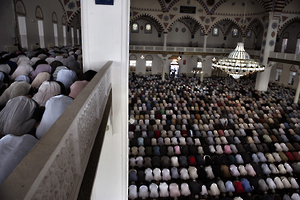
DESECRATION OF KORAN COULD PROVOKE ATTACK IN DAGESTAN
Publication: Eurasia Daily Monitor Volume: 3 Issue: 57
By:

On March 3 Russian security officials swept through several villages in the Khasavyurt district of Dagestan, North Caucasus.
According to RIA-Dagestan, “Officers of the Ministry of Interior Affairs [MVD] and the Federal Security Service [FSB] are combing the Khasavyurt area adjacent to Chechnya with the support of the 102nd Motorized Rifle Division, helicopters, and armored vehicles.” The Ministry also reported that a Kalashnikov assault rifle, two hand grenades, and 2,000 ammunition cartridges had been found in the village of Novosasitli in a house owned by a relative of Rasul Maksharipov, a Dagestani insurgent leader who was killed last summer (RIA-Dagestan, March 3).
Mopping-up operations, house searches, and arrests of suspected rebel sympathizers happen daily in Dagestan, but this time Russian military forces, not local police, took the lead, a tactical decision that immediately caused trouble.
On March 10, Islamskoe Vozrozhdenie, a website linked to the Muslims of Russia organization, posted an open letter from residents of Novosasitli. The letter revealed the details of the sweep and contained information not mentioned in the official report. Before they started the mopping-up operation, residents claimed, Russian soldiers forced all of the residents to leave their homes. The locals complained that the servicemen were drunk, stole money and jewels during the sweep, and broke furniture in many houses. One officer threatened to have his soldiers rape a female village, adding that the attack would be even worse than “what the Americans do with Muslims in Guantanamo or Abu Gharib” (Islamskoe Vozrozhdenie, March 10). In addition, people in Novosasitli insist that all of the weapons found in the village had been planted by the military to justify their violent raid.
Yet all of these alleged crimes pale in comparison to one specific incident that might have serious negative consequences not only for Dagestan, but also for Russia’s reputation before the whole Muslim world. At the home of Makhach Khabibov, Makhsharipov’s relative, Russian officers deliberately desecrated a Koran. According to the letter by the villagers, a Russian officer pulled the holy book from a shelf and methodically began to rip out its pages. Then he threw it on the floor and walked over it. Chernovik, a Dagestani newspaper, confirmed this information. A correspondent from the newspaper saw the desecrated Koran himself when he visited the village (newsru.com, March 16).
This provocation was so extreme that even some official Muslim leaders of Russia, who usually look the other way when officials violate the rights of ordinary Muslims in the country, protested.
At the end of last week, Mufti Mukkadas Bibarsov, head of the Muslim Spiritual Directorate of the Volga Region, said that this act of desecration must receive exactly the same strong condemnation from the government and Russian society as did the recent Danish cartoons lampooning the Prophet Mohammad (Islam.ru, March 16).
Mufti Nafigulla Ashirov, head of the Muslim Spiritual Directorate for the Asian part of Russia, echoed these words, arguing that anyone, Muslim or non-Muslim, should be angry at such actions and the dangers they pose to the unity and stability of the Russian Federation (Islam.ru, March 17).
Leaders of the MVD forces hurried to disavow their involvement in the incident. A source in the Command called the desecration of the Koran “a serious case” and said that an investigation into the incident was underway (Ekho Moskvy, March 16).
Nevertheless, it is unlikely that the desecration of the Koran was done on impulse. The witnesses say that the entire sweep was well organized and that Russians in civilian clothes (probably FSB officers) coordinated the actions of the Interior forces. Given the high level of advance planning, the provocative behavior of the servicemen, as well as the desecration of the Koran, could have been premeditated. The residents of Novosasitli said that, before the sweep began, the MVD troops fired guns in the air and helicopters flew over the village, which made the locals feel especially nervous and terrified. The Dagestani police and even the republic’s deputy minister of interior affairs were forcibly kept away from the settlement during the sweep (Islamskoe Vozrozhdenie, March 10).
The rough manner of the mopping-up operation resembles the massive sweeps that took place in Chechnya from 2000 through 2003. The aim of those “zachistkas” was to terrorize the Chechen population in order to make them stop supporting the insurgency. The result was exactly the opposite, however, since this brutal strategy only fueled resistance. The same reaction could happen in Dagestan, where the local insurgency had already gained significant public support.
“The desecration of the Koran has inspired serious public discontent in Dagestan,” says Abdurashid Saidov, a respected Dagestani journalist. “No doubt such blasphemy will stimulate the youth to join the rebels. And it should be clearly understood that actions such as the desecration of sacred Muslim items and tormenting unarmed civilians, including women, will not help security officials to frighten the Dagestanis, but, on the contrary, this can only lead to a second Nalchik in the largest republic of the North Caucasus. I do not think the Kremlin will gain anything for itself if what happened in Nalchik is repeated in Dagestan.” On October 13, 2005, insurgents swept into Nalchik, the capital of Kabardino-Balkaria, capturing key facilities and fighting local security forces. The authorities attempted to seal off the town, but the rebels managed to escape.
The Russian military does not listen to people like Saidov, operating under a different logic. “Religious fanatics understand only the language of force,” says General Yuri Nikolaev, a former army commander in the North Caucasus (see EDM, June 23, 2005).
Time will tell whose arguments are closer to reality.




